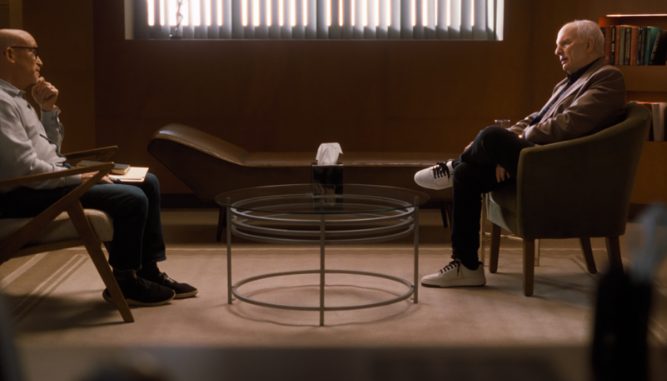
Brimming with insights; stuffed with revealing interviews and anecdotes and archival footage; bursting with flavor like a baked ziti; and as compelling, in its own way, as the show itself, “Wise Guy: David Chase and the Sopranos” is Alex Gibney’s artful and compelling two-hour, 40-minute documentary about the greatest show in television history.
If you’re a diehard fan of “The Sopranos” (and who isn’t?), you probably already know a fair bit about how the show came to be, and “Wise Guy” has, for a while, trodden a familiar path. The film is framed as a profile of the show’s visionary creator and executive producer, David Chase (the opening credits reprise the “Sopranos” Jersey drive-in with Chase in the passenger seat), who is interviewed by Gibney in an exact replica of Dr. Melfi’s psychiatrist’s office, a joke/stunt that recedes into the background but never loses its playful resonance, as it evokes the way “The Sopranos” was, for Chase, a kind of therapy. For him, even talking about the show, analyzing its secret formula, is done with a certain reluctance. (In this, Chase, who is so innocently sincere and sometimes brutally frank, is practically an open book.) Chase, born to Italian-American parents in 1945 and raised in New Jersey, discovered arthouse cinema in college (he says Fellini’s “81/2” opened his mind, though he didn’t necessarily understand what the film was about), and he was perfectly positioned, by age and temperament, to be one of the upstarts of New Hollywood. We see the Godard-parody student thesis film he made while at Stanford, and then he and his wife, Denise, move to Los Angeles, where he tries, unsuccessfully, to break into the movie business. Chase writes a cheap horror film called “Grave of the Vampires.” Then he was invited, based on an old script, to write an episode of “The Bold Ones” (one of my favorite shows as a kid), which helped him become a television writer. “The Rockford Files,” “I’ll Fly Away,” “Northern Exposure”: he became a successful power player in the small-screen world. But every day he worked on those shows, the limitations of network television left him a little numb. He couldn’t pretend that those shows represented his dreams. Everyone he knew told him to try writing a show about his mother.
Chase, obsessed with his desire to be a big-screen director, initially conceived of “The Sopranos” as a feature film; he wanted Robert De Niro and Anne Bancroft to star. He then tried to sell it as a television pilot, but all the networks turned him down. But HBO, replete with its new identity as a place that makes dramas and comedies that are more intimate than anything you can find on a network (“The Larry Sanders Show,” “Oz,” “Sex and the City”), was ideally placed to launch Chase’s vision. The burgeoning cable giant, represented by former president Chris Albrecht, actually made the suggestion that Chase shoot the show in New Jersey, even though it would cost more. In fact, every exterior scene was shot there. (The rest of the series was filmed at Silver Cup Studios in Astoria, Queens.) All of this will be familiar to plenty of “Sopranos” fans who have delved into the show’s background.
But then “Wise Guy” begins to capture aspects of “The Sopranos” that perhaps only a documentary could—and in the process, explores the mysteries inside the show. We see a montage of auditions, watching multiple actors try out for each role. Chase keeps saying that none of them are right, but most of the auditions are actually pretty good. Almost any actor could have done the roles on the network (if the show had worked that way).
What Chase really means is that they’re acting in the classic TV style. Then we see long-haired Michael Imperioli reading the script to Christopher, and he has something: a full personality, a calm confidence that stands out; the role suddenly exists in three dimensions. (Imperioli thinks the show is cheap, and assumes Chase is a soft gangster movie because his last name isn’t Italian.) Lorraine Bracco is the only movie star in the cast, and based on her performance in “GoodFellas,” she was cast as Carmela. But she didn’t want to take on that role again. She had her eyes set on Dr. Melfi, because Melfi’s cunning and cold-blooded qualities would be very different.